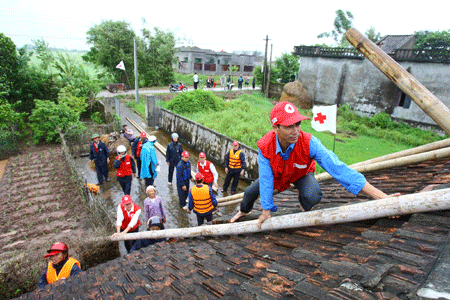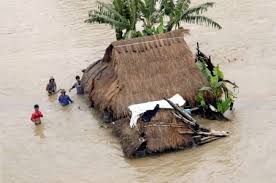
[24 Feb. 2016] — Economica Vietnam has completed the first phase of the study under the commission of the World Bank's Disaster Risk Finance and Insurance Program, GFMDR and GFDRR. The report of the initial phase of the study provides an updated stock-take of the currently existing financial instruments for disaster risk finance.It also provides an institutional review of the role of public agencies, non-public institutions and financial institutions in funding the costs imposed by disasters.


Vietnam is one of the world’s most exposed
countries to multiple natural hazards, including typhoons, tornados, floods,
and droughts. It is estimated that about 60 percent of its total land area and
71 percent of its population are prone to cyclones and floods. The annual
average direct economic losses caused by natural disasters are estimated at
about US$800m or 0.8 percent of GDP. Vietnam ranks third among the ASEAN Member
States. In addition, it is estimated that a 1-in-100 year event could cause
direct economic losses in excess of US$4 billion.
Disaster risk Financing and Insurance (DRFI) can help the government improve financial planning in advance to meet post-disaster funding needs most cost efficiently and effectively.The objective of this study is to provide a stock take of the current institutional and financial structure for managing the costs of natural disasters. In particular (i) to analyze existing risk financing and budgetary process in the aftermath of a disaster (e.g., emergency relief funds, budget reallocation and execution), including its performance and the legal and institutional governance framework in Vietnam; (ii) to determine current levels of post-disaster financing and the government’s explicit and implicit contingent liabilities to natural disasters; (iii) to identify any post-disaster resource gaps in the short, medium and long term; and (iv) set out policy options to improve the system of post-disaster financing.
It is planned that, in the second phase, case studies of selected major natural disasters in Vietnam in recent years will be conducted. Experts from Economica Vietnam and the World Bank will further assess the contingent liability of the government arising from natural disasters through a review of the relevant laws and decrees, identify and quantify post-disaster government budgetary deficits (funding gap) under different natural disaster scenarios, taking into account the temporal dimension of resource requirements. To conclude, the study will propose policy options to reduce the funding gap and to improve post-disaster budget execution processes.
 Ba Ria-Vung Tau: Bringing Provincial Competitiveness Index back among the Top Provinces (09/01/2016)
Ba Ria-Vung Tau: Bringing Provincial Competitiveness Index back among the Top Provinces (09/01/2016)
 Benchmarking and Mapping Business Registration Processes in selected ASEAN Member States (AMSs) (30/11/2015)
Benchmarking and Mapping Business Registration Processes in selected ASEAN Member States (AMSs) (30/11/2015)
 Improving Information Portals to Enhance Provincial Business Environment (30/08/2015)
Improving Information Portals to Enhance Provincial Business Environment (30/08/2015)
 Study on Impacts of FTAs and BITs on the Food Processing Industry of Vietnam (16/06/2015)
Study on Impacts of FTAs and BITs on the Food Processing Industry of Vietnam (16/06/2015)
 Support to Implementation of World Bank-executed Trust Fund (BETF) on Market Institutional Reforms (05/04/2015)
Support to Implementation of World Bank-executed Trust Fund (BETF) on Market Institutional Reforms (05/04/2015)
 Lao Cai District Competiveness Index (DCI) Report Completed (18/03/2015)
Lao Cai District Competiveness Index (DCI) Report Completed (18/03/2015)
 Final evaluations of two ILO projects on social and unemployment insurance (21/01/2015)
Final evaluations of two ILO projects on social and unemployment insurance (21/01/2015)
 Execution of ADB TA for Strengthening Microfinance Sector (08/12/2014)
Execution of ADB TA for Strengthening Microfinance Sector (08/12/2014)
 Development of the M&E Framework for the MPI - WB Inclusive Innovation Project (24/08/2014)
Development of the M&E Framework for the MPI - WB Inclusive Innovation Project (24/08/2014)
 Support to DICA Myanmar in Process Mapping, Reforms and Capacity Building (24/08/2014)
Support to DICA Myanmar in Process Mapping, Reforms and Capacity Building (24/08/2014)